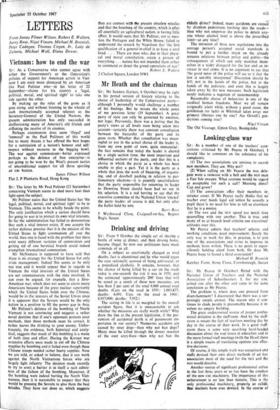Drinking and driving
Sir: From 9 October the simple act of sharing a bottle of wine at dinner, and then driving home, became illegal. So now our politicians have made criminals of us all.
On a subject so emotionally charged as road deaths, fact is abandoned and he who would argue the case rationally accused of being anti-social, or a prejudiced alcoholic. It remains, however, that the chance of being killed by a car on the roads today is one-seventh the risk it was in 1931, and the estimated 'approximately 200' lives that will be saved as a result of these new measures, are less than 2 per cent of the total 8,000 annual road deaths. (Cars on the road in 1931: 1,083,457; deaths: 6.691. Cars on the road in 1966: 8,917,000; deaths: 7,952.) The saving in life is so marginal to the overall accident figure, that it is unreasonable to ask whether the measures are really worth while? Why draw the line at the present legislation, if the pre- vention of accidental death is of paramount im- portance in our society? Numerous accidents are caused by stray dogs—then why not ban dogs? Many must be killed through the slower reaction of the over sixty-fives—then why not ban the elderly driver? Indeed, many accidents are caused by drunken pedestrians lurching into the roads— then why not empower the police to detain any- one whose alcohol level is above the prescribed limit—at any time?
The intrusion of these new regulations into the average person's accepted social standards is bound to put a further strain on the already tenuous relations between police and public—the consequences of which can only manifest them- selves in a wider disregard for the law and an in- crease in real crime. It is no argument to say that 'the good sense of the police will see to it that the law is sensibly interpreted.' Discretion should be left, not in the hands of the police, but in the hands of the judiciary, and even this is largely taken away by the new measures. Such legislation surely indicates a negation of statesmanship.
Reasonable choice of behaviour is one of the cardinal human freedoms. Must we all remain resignedly silent while, without a good cause, the gentleman (or lady) in Whitehall takes away our primary liberties one by one? Are Orwell's pre- dictions coming true?


































 Previous page
Previous page